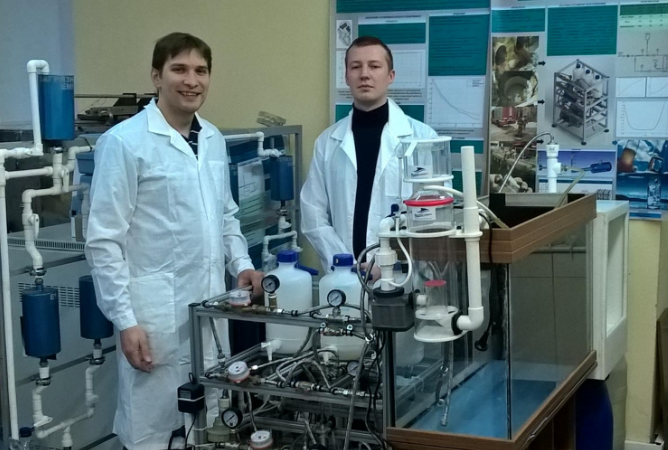Hybrid Nuclear Desalination
Published on by Water Network Research, Official research team of The Water Network in Technology
Researchers are developing hybrid nuclear desalination technique with improved efficiency.

Associate Professor I.M. Kurchatov and graduate student R.A. Alexandrov work at the research stand of water purification. Credit: National Research Nuclear University
To improve environmental safety and desalination technology, it is necessary to solve a global scientific and technological problem—the creation of an integrated water supply system based on the use of new high-efficiency desalination methods such as nuclear membrane desalination or hybrid technologies.
The membrane method of reverse osmosis is based on the filtering of salt water under the influence of differential pressure across a semipermeable membrane allowing water molecules and excluding salts; the pressure differential should be more than the so-called osmotic pressure (~ 30 atm. for seawater).
In membrane electrodialysis, ions penetrate through the so-called ion-exchange membranes, and fresh water remains in the channel.
These membrane methods can be used in conjunction with nuclear desalination (hybrid desalination technologies), i.e., they can be added to existing nuclear facilities, where there is a relatively cheap access to thermal energy.
Scientists from the National Research Nuclear University MEPhI (Russia) have developed a new technology and technological schemes for a pretreatment unit taking into account data on the composition of pollutants, salinity and performance of water treatment systems.
It is based on the reagent methods with hydrodynamic activation of the process of pollutant withdrawal in coagulation, flocculation and adsorption, which reduces the unit's size and cost.
Moreover, the majority of the sparingly soluble salts can be removed in the pretreatment unit, which increases the efficiency of the system as a whole.
From the pre-water treatment unit, salt water flows into the desalination unit, a very energy-intensive process. Hybrid desalination schemes are proposed to reduce the energy consumption of the desalination process. These schemes use distillation and membrane methods in combination, to produce both drinking water and process water.
In addition, the project proposes the development of an integrated technological system of water recycling and desalination systems to reduce environmental burdens and improve the energy efficiency of the system as a whole.
The results are intended to be used in complex projects of the State Corporation Rosatom, in particular, in relation to nuclear power plants in Egypt, where it is planned to realize a nuclear desalination technology.
Read more at: Phys.org
Media
Taxonomy
- Desalination
- Industrial Use
- Electrodialysis
- Energy Efficiency
- Nuclear Energy
- Nuclear Plant Operation
- Desalination